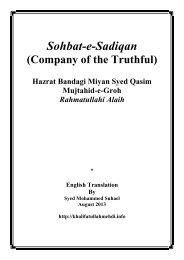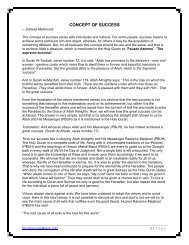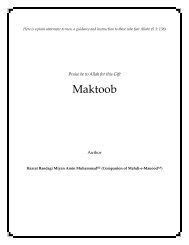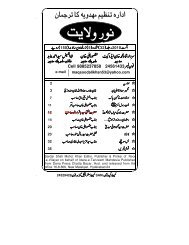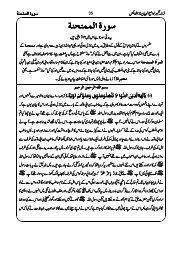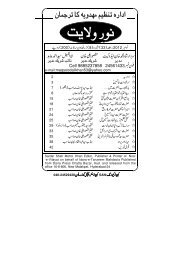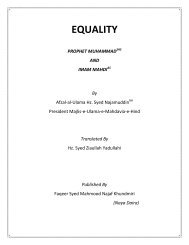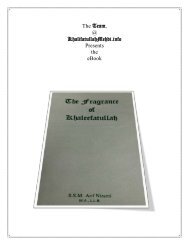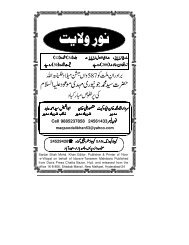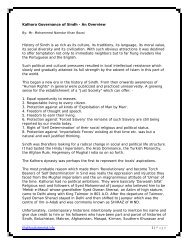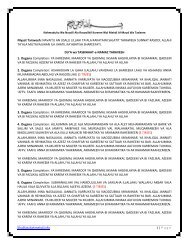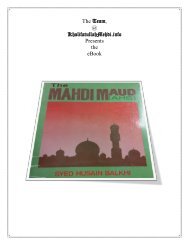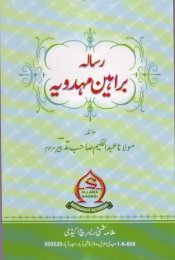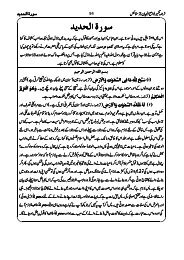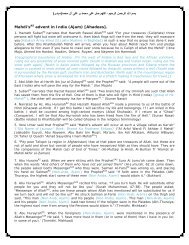TRUST IN ALLAH [Tawakkul] - Khalifatullah Mehdi
TRUST IN ALLAH [Tawakkul] - Khalifatullah Mehdi
TRUST IN ALLAH [Tawakkul] - Khalifatullah Mehdi
Create successful ePaper yourself
Turn your PDF publications into a flip-book with our unique Google optimized e-Paper software.
Excerpt from Tauzihat Asad-ul-Ulama Hzt Abu Sayeed RH<br />
Imam Mahdi AS has guided [his followers] towards the highest rank of Trust in<br />
Allah [<strong>Tawakkul</strong>]. The believers who have reached the station of Lahut [Divine Presence]<br />
think that any food other than halal-e-tayyib [chastely permitted] as haram [prohibited]<br />
for them. Somebody is narrated to have asked Imam Mahdi AS , “What should one do if one<br />
cannot be patient in hunger?” The Imam AS said, “Let him die.” The questioner repeated<br />
his question. Again the Imam AS said, “Let him die.” The questioner asked a third time,<br />
“Miranji! What should he do if he does not have the strength and stamina to be patient in<br />
hunger?” The Imam AS replied, “Let him die. Let him die. Let him die.” 33<br />
This is the highest rank, after reaching which a believer accepts death, but does<br />
not allow any diminution in his Trust in Allah, as it should be.<br />
Iqbal says, “O bird of Divinity! Death is better than the food, which curtails your<br />
flight.”<br />
While in the teachings of Imam Mahdi AS , a believer is guided to reach the highest<br />
ranks of excellence [‘aliyat]; there are other commands of a lower level of rukhsat<br />
[concession]. The parable says: “Somebody in a congregation of the migrant-companions<br />
is narrated to have asked Imam Mahdi AS , “What one should do if one was not patient<br />
enough to bear hunger.” The Imam AS said, “Let him go and earn a cheetal [or taka, a local<br />
coin] or two and eat….” 34<br />
Please note Parable 70. Hazrat Shah Dilawar RZ has quoted Imam Mahdi AS as<br />
saying, “During the time of destitution, if Allah Most High were to send more charity [for<br />
the death anniversary of Prophet Muhammad SLM ], the money should be used to feed the<br />
inmates of the daira two or three times because they are the rightful persons to benefit<br />
from futuh [charity]; and not the others. However, it is a different matter, if some others<br />
benefit from it.” 35<br />
Hazrat Bandagi Miyan Syed Mahmood Syedanji RA Khatam-al-Murshidin,<br />
grandson of Imam Mahdi AS , has issued certain commandments pertaining to rukhsat<br />
[concession]. The third order says: “The food sent by Allah could be eaten twice.” This<br />
shows that the concessionary command Hazrat Syedanji RA had issued was well within the<br />
parameters of the commandments of the Imam AS .<br />
Please note Parable 64. In it Bandagi Miyan Syed Khundmir RZ is quoted as telling<br />
his followers, “The people of the lust [nafs] always seek orders to serve.” Then again he<br />
33 RZ<br />
Naqliat Miyan Abdur Rashid , Parable 59, page 44.<br />
34 RZ<br />
Hashia Insaf Nama, Vali bin Yusuf , Hyderabad, 1369 AH, page 44. The Parable continues, “But if he<br />
earns a taka one day, he would be tempted to earn more the next day. The Imam AS again said, ‘Shariat<br />
permits earning and trade. But the intention of the person indulging in earning and trade should be to<br />
continue to remain capable of worshipping, religious acts and abstaining from interdictions. But he should<br />
not become a victim of greed and defalcation.’ He also said, ‘If the earner does not have this as his<br />
objective, he would be tempted to become proud and begin to amass abundance of wealth. He would fully<br />
engage himself in profiteering and eating. But if he does not engage in earning and fully engages himself in<br />
learning the knowledge of Shariat, Uzlat and Khilwat [seclusion], and if the objective of all this is the<br />
achievement of worldliness, his abode [in the Hereafter] would certainly be Hell forever.’”<br />
35 RZ RA<br />
Naqliat Miyan Abdur Rashid , Urdu translation by Hazrat Abu Sayeed , Hyderabad, 1369 AH, pages<br />
5o-51.<br />
<strong>Khalifatullah</strong>mehdi.info 7 | Page


![TRUST IN ALLAH [Tawakkul] - Khalifatullah Mehdi](https://img.yumpu.com/12326105/8/500x640/trust-in-allah-tawakkul-khalifatullah-mehdi.jpg)
